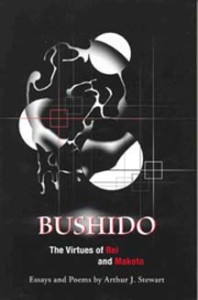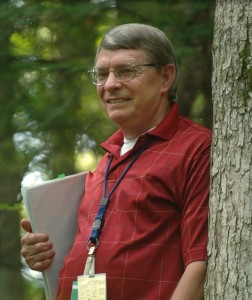 by Arthur J. Stewart
by Arthur J. Stewart
This second collection of essays and poems by Arthur Stewart has a single theme – respect and care for life.
Whether addressing cultural differences in Ghana, care of an Appalachian stream or increasing concerns of global warming, Stewart illustrates the importance of two of the seven Bushido virtues – Rei and Makoto – respect for the earth and its diversified and sometimes disparate cultures and establishing honesty through the pursuit of truth and pushing back the sense of disorder. He does this not only with the seriousness of a scientist but also with a vivid sense of humor, continually challenging the reader to change the lens and experience a new perspective.
0-9658950-6-8
96 pages, soft cover
$15.00
Bushido
 Author
Author
Arthur Stewart is an ecologist, senior scientist, essayist and poet. He graduated from Northern Arizona University, and then spent two years as a Peace Corps Volunteer in Ghana. Upon returning to the U.S., he earned his Ph.D. at Michigan State University, then completed a postdoctoral fellowship at Oak Ridge National Laboratory, in Oak Ridge, Tennessee. He taught aquatic ecology and conducted stream-ecology research as an assistant professor at the University of Oklahoma, then returned to Oak Ridge National Laboratory to work as an aquatic ecologist and ecotoxicologist. He has authored or co-authored more than sixty articles and book chapters and has served as editor or associate editor for Environmental Toxicology and Chemistry, Journal of the North American Benthological Society, and Ecotoxicology. He is currently adjunct research professor at the University of Tennessee, and lives in Lenoir City. Stewart’s first collection of poems, Rough Ascension and Other Poems of Science was published in 2003.
Reviews
“A profoundly original concept, steeped in traditional wisdom, this gorgeous volume is life-enhancing — something to take us soaring; something to hold onto while we re-experience space, earth, sky.”
— Marilyn Kallet, author of Circe, After Hours
Excerpts
Ghanaian Story
Kwami
Growling bear of a black man, Kwami swings
his massive head left and right, bright eyes
buried in a coarse face, gaze searing the underbrush: he has
the perverse will of a hungry man in a desperate place.
Huge buttressed trees he hacks and girdles to bring down
a little burst of light-patch. Lianas, pulled, slashed
by machete, thick as an arm are oozing: they get dragged and stacked.
They smolder; a crackle of wet smoke crawls from the tangle.
Things grow
practically as fast as he can cut. I stand sweating just watching him
ripping a gardening place by the home. His wife is growing
a confabulation of yams: their soft green tendrils
creep up bamboo poles, minor hope
blasted dark each afternoon. He wants to grow
maize, okra and tomatoes but the huge trees
near the garden’s edge are too dominant.
Today clouds take all morning
pushing up, lusty white
mushrooms of energy: later the drops
come huge and fall slow. They hang
suspended as they fall, each
drop is its own thing, coming
suddenly together in a rushing roar: binding
to one another, joining
the sounds of drops, mingling —
they speak in many little voices. In the rain for a moment
Kwami just stands there, breathing, listening.
After the rain: the murmur of children,
the smoke of lianas lingering. And always
the yams, pallid masses dug from the thin red dirt in season,
steamed or boiled or baked, or stewed or souped. He, Kwami,
still standing, but now
in the doorway of the dark hut,
rattled loose to thunder, looking out
past roof-thatch, past the papaya tree, into the forest,
into the afternoon made dark luminescent
by rain receding.
The fish call with no voice
After the rain I walk to the edge of a pond a short way
into the forest: the fish call
somehow with no voice. I see them slipping
pale as yams, back and forth
in the water like smoke. The pond
is dark and motionless: it is
holding its breath; it seems pinned
to the forest floor by the lilies, thick at the edge.
A bird calls, then quiet. My heart lurches like a blind thing,
though glancing back towards Kwami’s hut I can see
rooftop: rare rain-free
afternoon sun glinting
from the clearing. The only sound
this instant, somewhere,
trickling water.
Then
more sound, motion. Four children chattering,
from Kwami’s house; naked but for tattered shorts
come towards the pond to watch: their voices
like birdcalls, a vine winding nowhere. In the pond
the fish move
just under the water; they seem to be counting
the slow strokes of their fins;
they are coming
like children
now through the stems of the lilies, towards me, opening
and closing their mouths,
staring —
I do not know how they know
but they move
closer, their mouths, the light
and shadows working together
in the luminescent world of green and black, the fish
silver, in silence. They come to me and I, mindless
god of do-good then
plunge the arm and grab one by the gill-cover and jerk
the heavy body to the light, up
flopping hard bankside, silver on shadow,
sides heaving, red gills gripping
solidly at empty air, the mouth
opening and closing now my heart
lunging in time to the bird-call
chattering of children
arriving, excited.
Pride spills through me like an uprush of rain backwards: food,
beyond the pale of yam, cheap rice,
onions and lean black beans, the wet fish
still thrashing weakly.
Trophy home
Hooking fingers under gill-cover the wetness
bleeds down my hand; I swing the timeless symbol of trophy-catch;
I feel pure, slimed joyful to bird-call perfection.
A thing is wrong and set to right
Kwami lunges from the dark of hut-house reeking of palm wine, eyes
wide blazing, clarion face a storm of disbelief stumbling anger, staring
at the fish
hanging from my hand: the dead soul
of an ancestor: his father’s father, his mother’s mother, or older brother,
or brother of brother, maybe; he reeks and rants, the bird-calls
of the motley children gone,
the sun
slamming now hard bars of light,
the words crash the high trees, the clouds
still pushing up away; his woman
bent hoeing yam hills straightens, tightens her cloth, stands silent
yet things
still green in the silver shadows.
I am emptied completely. We talk
for a long time that afternoon, settling until fireflies
work together at dusk, punctuating the calls of the new night
with small
speckles of hope. It takes two big calabashes of fresh palm wine
and a full
bottle of Schnapps to right the wrong and the fish
we bury at last, drunk,
staggering to the yam field
together, machetes swinging dangerously digging random holes in
darkness.